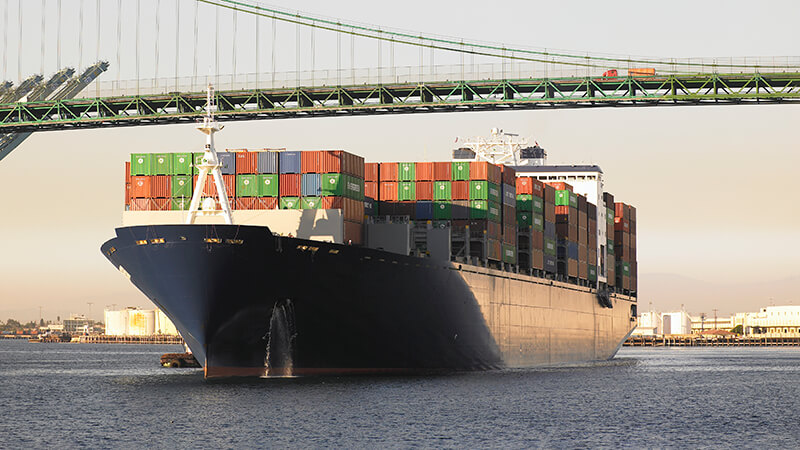Shipper | Market updates 6 minutes
What is cargo insurance and how can it protect your bottom line?

It is essential that shippers and carriers alike understand why cargo insurance is so important and how it can act as solid protection for a company’s bottom line.
What is Cargo insurance?
Cargo insurance covers loss or damage to goods during transportation by land, sea, or air. This ensures its value is covered if something goes wrong in transit.
Cargo insurance is essential for several reasons. First, it protects against the risk of loss or damage to the goods being transported.
This can occur due to various unpredictable factors such as:
- Accidents.
- Theft.
- Natural disasters.
- Other unforeseeable events.
Without cargo coverage insurance, the owners of the freight and the carrier would be responsible for covering the costs of any losses or damages that occur during transit.
6 common types of cargo insurance coverage
Several types of insurance for cargo are available, depending on the shipper’s or carrier’s specific needs. These include all-risk and named-perils policies.
All-risk policies provide the most comprehensive coverage and are typically used for high-value goods.
Named-perils policies, however, cover specific risks such as fire or theft.
The specific coverage provided by a cargo insurance policy can vary depending on the policy terms and conditions but typically includes the following:
- Loss or damage to goods: This is cargo coverage for loss or damage to goods during transit. Damage caused by accidents, natural disasters, theft, and other unforeseen events, is generally covered under these policies.
- Theft and pilferage: Cargo insurance can cover theft or pilferage of goods during transit.
- General average contributions: This coverage protects in the event of a maritime incident where a sacrifice or expenditure is made for the common good of the vessel, crew, and cargo.
- Delay in delivery: Some cargo insurance policies cover losses resulting from delays in the delivery of goods caused by covered perils.
- Salvage and recovery costs: Cargo insurance can cover the costs associated with salvaging or recovering goods lost or damaged during transit.
- Custom duties: With this type of insurance, shippers can file claims to cover the cost of customs duties paid on shipments lost or damaged in transit.
The specific coverage provided by a cargo insurance policy can vary. It is vital for businesses and individuals to carefully review the policy terms and conditions and ensure that they have adequate coverage for their needs.
The differences between cargo insurance and general liability insurance
Cargo insurance and general liability insurance are two types of insurance policies that provide coverage for different risks.
Cargo insurance
Cargo insurance is a form of property insurance that provides financial protection against loss or damage to the goods during transit.

Cargo insurance policies can be tailored to meet the specific needs of the business or individual, considering:
- The value of the goods.
- The mode of transportation.
- The destination.
- The level of risk involved.
General Liability Insurance
In contrast, general liability insurance covers a wide range of risks that businesses may face, such as bodily injury, property damage, and advertising injury.

This is coverage designed to protect businesses from financial losses that may arise due to lawsuits, claims, or legal action taken against them by third parties.
General liability insurance policies can also be tailored to meet the specific needs of the business, considering:
- The type of business.
- The level of risk involved.
- The amount of coverage.
One of the most significant differences between the two types of insurance is cargo insurance is typically purchased on a per-shipment basis. In contrast, general insurance is generally purchased as an ongoing policy that provides coverage for a specific period of time and is renewed at the end of that time frame.
The benefits of cargo insurance
Along with protecting against loss or damage, cargo insurance can help mitigate transportation’s financial risks. This includes the risk of delay or disruption to the delivery of goods, which can result in extra costs for storage, rerouting, and other expenses. Cargo insurance can help to cover these costs, ensuring that shippers and carriers are not left with unexpected financial burdens.
When one’s supply chain stretches across borders, a range of legal and regulatory requirements must be met. This includes requirements for cargo insurance coverage.
Cargo insurance is essential to:
- Moving your freight internationally.
- Ensuring compliance.
- Allowing goods to be transported easily and efficiently to meet your business’s market demands.
Understanding the cost of cargo insurance
In general, the cost of cargo insurance is typically calculated as a percentage of the value of the goods being insured and is dependent on the specific needs of the business.
Two of the most significant variables in cargo insurance cost are the coverage limits and deductibles selected by the policyholder. Higher coverage limits and lower deductibles will typically result in higher premiums, while lower coverage limits and higher deductibles will result in lower premiums.
Along with these factors, the insurance market plays a role in determining the premium price of a cargo coverage policy. There is a wide range of price differences between cargo insurance companies. This is why getting multiple quotes for coverage is important.
Lastly, external factors play a role in determining how much a policy will cost.
Cargo insurance companies consider:
- The level of competition in the marketplace.
- The global economy.
- Natural disasters.
- Political instability in a region into their pricing models.
As we’ve discussed, premiums are assessed on a per-shipment basis. Thus, the risks associated with a specific route, origin or destination will help determine the insurance cost.
Freight Tip:
To get an accurate estimate for cargo insurance premiums, businesses and individuals should consult with at least three insurance companies and get quotes based on the specific needs and circumstances of the shipment. It is essential to carefully review the terms and conditions of the policy and ensure that the coverage and cost meet the needs and budget of the business or individual.
Cargo insurance is an essential element in a shipper’s risk management protocols
One important thing to note about cargo insurance is that it is not just the carrier’s responsibility to get coverage. All reputable carriers have general insurance and specific policies to cover freight operations, but shippers are still responsible for ensuring their goods are adequately insured.
Shippers are the ones who stand to lose the most in the event of loss or damage. Shippers need to work with their carriers to ensure the right level of coverage is in place and that all parties are aware of their responsibilities and obligations under the insurance policy.
Another important consideration is the role of third-party logistics providers (3PLs). While 3PLs may offer some insurance coverage as part of their services, shippers and carriers need to understand the limitations of this coverage and ensure that they have adequate coverage in place for their specific needs.
Where do you get cargo insurance?
Cargo insurance can be obtained from various sources, including insurance brokers, freight forwarders, and carriers. These providers can help you find the right policy to fit your risk management needs and budget:
Insurance brokers
They specialize in providing insurance coverage to businesses and individuals and can help clients find the most appropriate coverage for their needs. Brokers can offer various options from different insurance companies, helping clients make informed decisions by comparing cargo coverage, limits, and premiums.
Freight forwarders
They are companies that specialize in arranging the transportation of goods and often offer cargo insurance as part of their services. These companies can recommend the best type of coverage for the goods being transported and help clients get quotes from insurance providers.
Carriers
They may also offer cargo insurance as an optional service for their customers. In such cases, the insurance cost may be included in the shipping fees or provided as an additional service for an extra fee.
It is essential to carefully review the terms and conditions of the policy and ensure the coverage and cost meet your budget the business goals. Consulting with insurance brokers, freight forwarders, and shipping companies can help shippers find the most appropriate coverage for their needs and protect them against financial losses resulting from loss or damage to goods during transit.
Why cargo insurance is important
There is no way around it. Cargo insurance is an essential component of modern transportation and logistics. If your business relies on materials getting into production, and finished products going to market, then cargo insurance is a must-have to protect your operations and profitability.
Layered security keeps cargo and freight safe, secure and theft-free
Cargo security: Advanced tracking prevents cargo theft and protects high-value freight
Drive your business forward
Sign up to receive our industry leading newsletter with case studies and insights you can put to use for your business.














